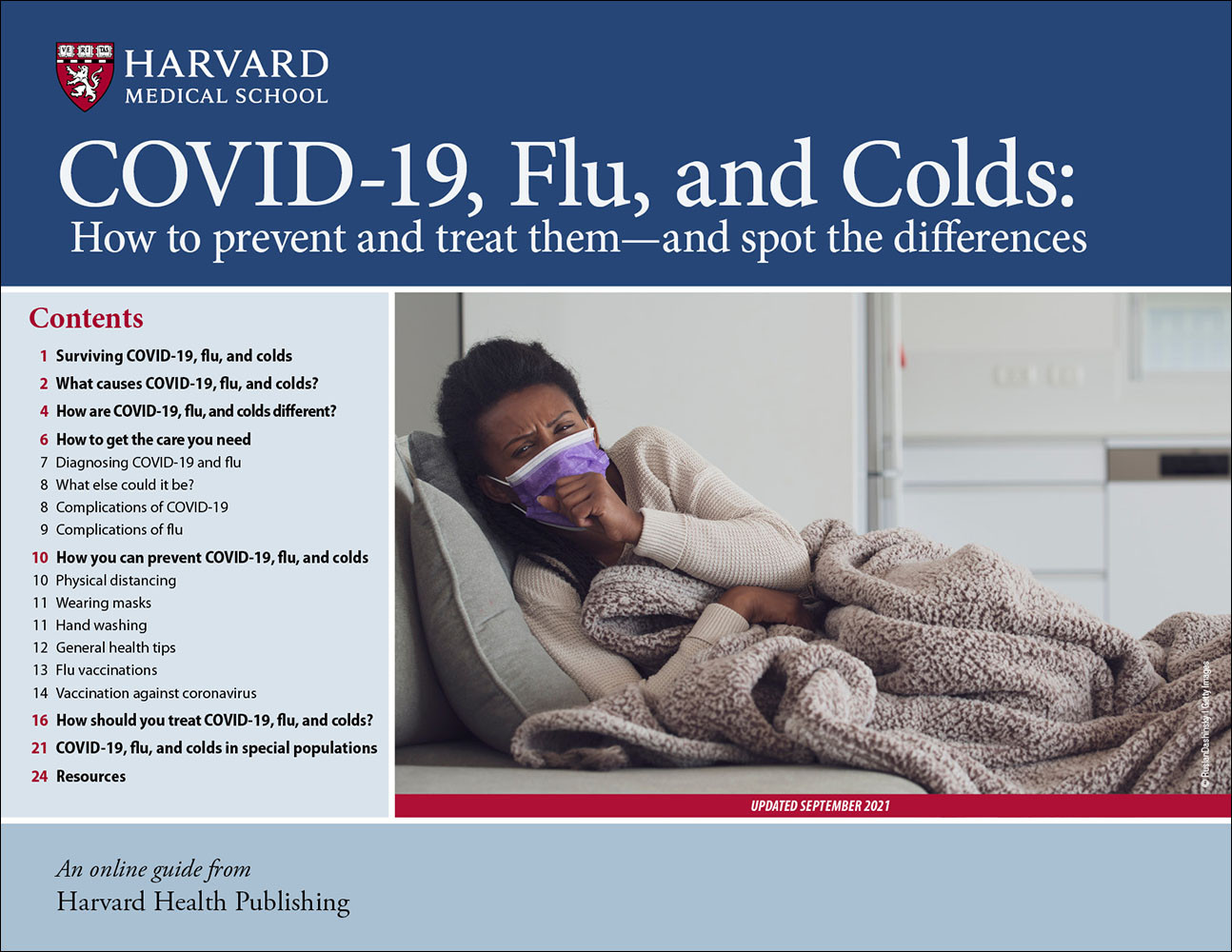Answers to questions about long COVID
What science does (and doesn't) know about this complex condition.
- Reviewed by Howard E. LeWine, MD, Chief Medical Editor, Harvard Health Publishing; Editorial Advisory Board Member, Harvard Health Publishing

While the country continues to grapple with COVID, a new aspect of the pandemic has emerged: long COVID, also known as post-acute sequelae of SARS-CoV-2 infection, or PASC for short.
PASC is marked by persistent COVID symptoms 30 days or more after a person tests positive for COVID. PASC also can emerge with new COVID-related symptoms weeks or months after symptoms of the initial infection have gone away. Scientists are still learning about PASC, but they have discovered much so far. Here's a look at what we know and what questions remain.
Who is at risk for PASC?
According to the American College of Cardiology (ACC), an estimated 10% to 30% of people who have had COVID may experience PASC. "Yet there is no ironclad evidence of who specifically may get PASC," says Dr. Bruce Levy, chief of the Division of Pulmonary and Critical Care Medicine at Harvard-affiliated Brigham and Women's Hospital.
Still, some trends have emerged. For instance, PASC strikes about two to three times more women than men, and people who are over age 50 are more vulnerable.
Individuals with certain conditions tend to be at higher risk. A study in the March 3, 2022, issue of Cell found that several factors at the time of initial COVID diagnosis stood out among people who went on to develop PASC. These include type 2 diabetes and a reactivation of the Epstein-Barr virus (which causes mononucleosis and remains, mostly dormant, in the body lifelong).
Other research suggests that having asthma or being overweight may play a role. The risk for PASC also may correlate with the severity of the initial infection. One study found that PASC was more than three times more likely to occur in people who'd been hospitalized with COVID and almost nine times more likely in people who'd spent time in intensive care.
What are the symptoms?
The PASC symptoms most often reported are fatigue, shortness of breath, and problems with taste or smell. Other common symptoms are coughing, headache, "brain fog" (confusion and trouble focusing), anxiety, depression, and joint and chest pain.
People tend to have one or more of their original COVID symptoms, but that is not always the case, and new symptoms can emerge. "The severity of PASC symptoms can also vary," says Dr. Levy. "For instance, you may have had mild fatigue with COVID, but it's more severe with PASC, and it may get better and worse from day to day." Even people who never had symptoms with their COVID infection can still develop PASC.
How is PASC diagnosed?
There are no tests for PASC like those for COVID. Doctors often use a battery of tests to help understand what's triggering a person's symptoms, such as blood tests (to look for inflammation levels), heart rate and blood pressure checks, chest x-rays, an ECG, and tests to measure lung and breathing function.
How long does PASC last?
The length of PASC varies from four weeks to six months, and in some patients, symptoms can last substantially longer. For a study in the September 2021 issue of Annals of Internal Medicine, researchers followed 410 people after they were diagnosed with COVID and found that 39% had lingering symptoms seven to nine months later. "It's all over the map in the published literature," says Dr. Levy.
Is PASC contagious?
PASC is not contagious, nor do symptoms indicate you are positive for COVID. If you get a positive test result, it's most likely due to a new infection.
Can PASC be treated?
Currently, there are no evidence-based treatments for PASC. But there are many therapies to help reduce and manage symptoms. Your doctor can recommend a course of action based on what troubles you most. "For most patients, it also is helpful to adhere closely to healthy lifestyle modifications, including a regular schedule of sleep and activity," says Dr. Levy.
Does PASC cause new issues?
This area of research is ongoing, but scientists have found that PASC may contribute to other health issues. For instance, a study published March 7, 2022, in Nature discovered that people (average age 60) with mild PASC suffered tissue damage and shrinkage in brain areas related to smell, decision making, and retrieving memories. It's not yet known whether these effects persist or are reversible. PASC also may raise the risk of prolonged lung problems. A study published online March 15, 2022, by Radiology looked at 100 PASC patients (a third of whom had been hospitalized with COVID) and found that 58% had lung abnormalities, most often consistent with inflammation or scarring.
Observational studies show increased risks for heart attacks and heart failure after a COVID infection. The ACC suggests that PASC patients who have cardiovascular disease or symptoms like shortness of breath, fatigue, and chest pain be evaluated by their doctor before they resume exercising.
There is also emerging evidence about the relationship between PASC and gastrointestinal tract dysfunction that leads to diarrhea, and abnormalities in the peripheral nervous system that may trigger neuropathy (nerve disease that causes pain, tingling, and numbness that often begins in the hands and feet and spreads into the arms and legs).
Does being vaccinated protect you from PASC?
People who get vaccinated can still develop PASC. Generally, though, vaccinated people seem to have a 50% lower average risk of developing PASC than unvaccinated people. Just as COVID symptoms are generally less severe in vaccinated people, their PASC symptoms also tend to not be as serious as in people who aren't vaccinated. "However, it is still not clear if vaccine boosters further protect against PASC," says Dr. Levy.
Can we do anything else to avoid PASC?
Outside of vaccination, no strategy has convincingly been shown to ward off PASC, according to Dr. Levy. "Managing risk factors linked with PASC, like type 2 diabetes, obesity, and asthma, may offer protection," he says. "Observational data suggest that early use of antiviral therapy [during the initial COVID infection] may decrease the incidence of PASC, but more research is needed."
Image: © niphon/Getty Images
About the Author

Matthew Solan, Former Executive Editor, Harvard Men's Health Watch
About the Reviewer

Howard E. LeWine, MD, Chief Medical Editor, Harvard Health Publishing; Editorial Advisory Board Member, Harvard Health Publishing
Disclaimer:
As a service to our readers, Harvard Health Publishing provides access to our library of archived content. Please note the date of last review or update on all articles.
No content on this site, regardless of date, should ever be used as a substitute for direct medical advice from your doctor or other qualified clinician.
















